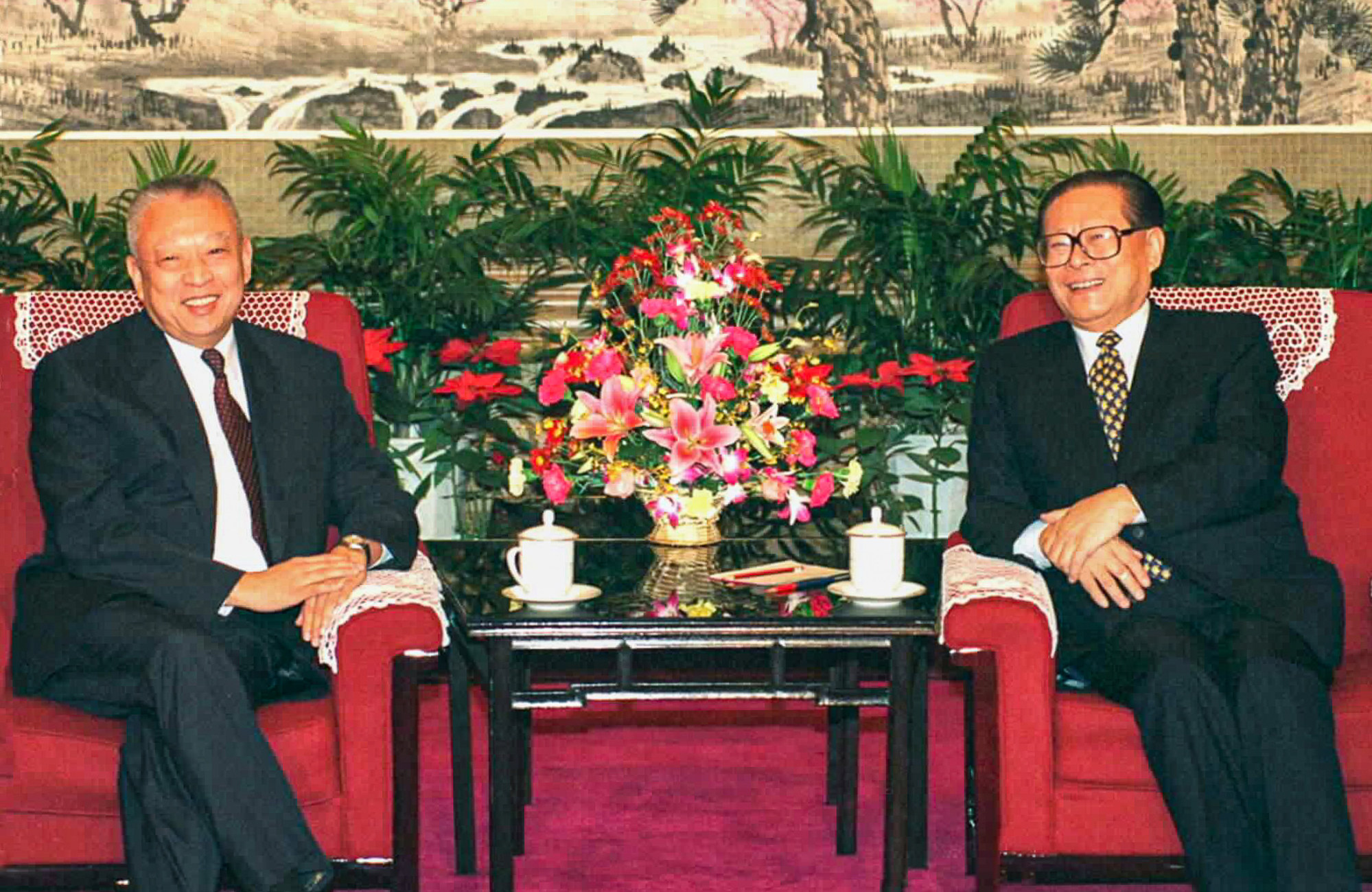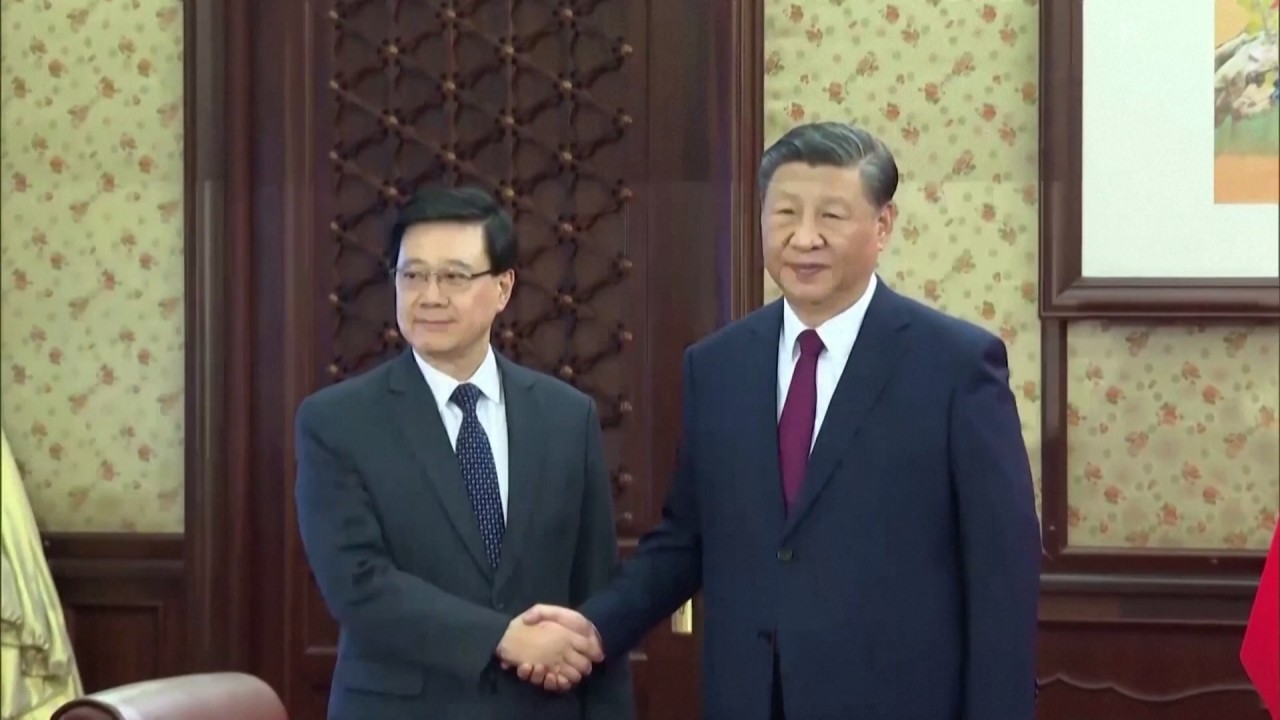The purpose of the duty visits, which have been carried out every year since Hong Kong and Macau were returned to Chinese rule, is for the chief executives to brief state leaders about their work.
This year, there were a few noteworthy changes to the annual trips.
Firstly, the Chinese president and the premier, who heads the State Council, together met each chief executive at the central government’s headquarters in Zhongnanhai during their recent duty visits.
Hong Kong leader ends duty visit vowing to boost ties with mainland neighbours
Hong Kong leader ends duty visit vowing to boost ties with mainland neighbours
Xi, also the general secretary of the Chinese Communist Party, on Monday presided over the closed-door meeting in which city leader Lee sat to his right and Premier Li Qiang to his left, along with senior officials overseeing Hong Kong affairs flanking both sides of the table.
In the session’s first four minutes, in which the press was present, the premier did not speak to Lee, unlike his predecessors. The chief executive briefed the leaders on the city’s progress after Xi gave him recognition for his work and set out his own expectations.
The change marked a stark contrast to previous duty visits between 1997 and 2014 in which the chief executive would sit next to the premier and then the president in two separate meetings, much like how foreign leaders were received by their Chinese counterparts.
From 2015 onwards, the annual meetings were held at a long office table with mainland officials presiding over the conversation.
Lau Siu-kai, a consultant from the semi-official Chinese Association of Hong Kong and Macau Studies think tank, said the new arrangement was likely to be linked to the restructuring of Beijing’s top office overseeing Hong Kong and Macau affairs into a higher-level outfit that now reports to the party’s Central Committee instead of the State Council.
“The party is the maker and overseer of the most important Hong Kong policies in the past few years,” Lau said, referring to the Beijing-imposed national security law and the electoral overhaul to ensure only “patriots” ruled Hong Kong.
“Xi has a critical identity as the leader of the party that exercises overall leadership.
“This change [to the duty visits] was made to highlight the superior roles of Xi and the party on an occasion that could be seen by the public.”
Hong Kong bid to lure more overnight visitors and develop high-quality tourism
Hong Kong bid to lure more overnight visitors and develop high-quality tourism
The revamping of Beijing’s top office overseeing Hong Kong affairs, announced in March, involved a series of changes aimed at strengthening the party’s leadership and improving accountability.
The second major change during the recent duty visit was the line-up of mainland officials, which for the first time included four of the seven members of the Politburo Standing Committee.
Cai Qi, director of the General Office of the party’s Central Committee, and Chinese Vice-Premier Ding Xuexiang, leader of the Central Leading Group on Hong Kong and Macau Affairs of the party’s Central Committee, also attended the meeting.
In past years, officials from the Hong Kong and Macau Affairs Office and Beijing’s liaison offices in both cities were the key figures accompanying the state leaders.
“This is a gesture to reflect the great importance Beijing attaches to Hong Kong, and also proof of a streamlined bureaucracy with unified communication that aims to improve efficiency in policy delivery,” said Tam Yiu-chung, a former Hong Kong member of the National People’s Congress Standing Committee, China’s top legislative body.

Tam also pointed out that leaders of the United Front Work Department and the Central Political and Legal Affairs Commission, both under the Central Committee, attended the meeting for the first time.
He said he expected their attendance would help the department better coordinate Hong Kong’s patriotic organisations, and it would be for the commission to ensure that the city’s plan to enact its own security legislation would align with Beijing’s policy direction.
The Basic Law, Hong Kong’s mini-constitution, declares that the city enjoys a high degree of autonomy. The central government in recent years has increasingly emphasised its “comprehensive jurisdiction” over the city.
The third change noted by observers was that the duty visits were becoming more formal, or “more institutionalised”.
President Xi Jinping praises Hong Kong leader over national security, district poll
President Xi Jinping praises Hong Kong leader over national security, district poll
Footage from state media showed that both Lee and Macau Chief Executive Ho Iat-seng read out their opening remarks separately and were seen carrying booklets with similar covers.
After the meeting on Monday, Lee met the press and outlined the five key topics he brought up with Xi: the city’s timeline for enacting its own security legislation as required by Article 23 of the Basic Law; the recent district council election; improving governance and the livelihoods of residents; and the city’s international connectivity.
Viewing the topics Lee outlined in the context of Xi’s remarks revealed the priorities of the Hong Kong administration, veteran China watcher Johnny Lau Yui-siu said.
In his speech, Xi praised Lee for firmly safeguarding national security and revamping Hong Kong’s district council system.
Lau said despite the poll’s record low turnout of 27.5 per cent, it symbolised “the last piece of the puzzle” in Beijing’s electoral reforms to ensure no anti-China elements emerged in Hong Kong’s governing structure.
He added he expected that fending off national security threats would still be a priority for Beijing, despite the recent meeting between Xi and US President Joe Biden helping to ease tensions between the two superpowers.
Hong Kong’s priorities, therefore, would not only be focused on enacting its own security law, but also enhancing awareness of national security, Lau said.
“This is why the district council system will play a key role in promoting the policies,” he said.
“The Hong Kong government has to deliver substantial results without delays and will have no one to blame for any policy failure in the future.”

